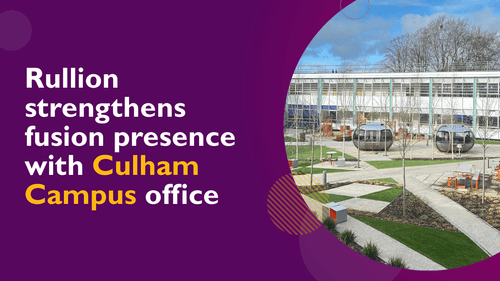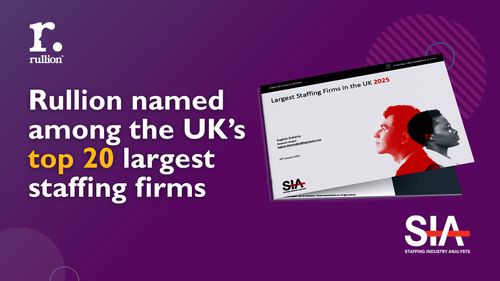Regenerating Futures: NWG Innovation Festival 2025
How a week of creativity and collaboration helped inspire the next generation of talent in water and utilities jobs
The NWG Innovation Festival 2025 brought together hundreds of partners, industry experts, and young minds to tackle some of the biggest challenges in the water and utilities sector. As a leading utilities recruitment agency, Rullion played a hands-on role in supporting early careers, empowering diverse voices, and helping Northumbrian Water deliver real social value.
Here’s how the week unfolded.
Supporting young talent through practical, people-first sessions
More than 300 students joined the Young Citizens Work Experience Festival and regenerating your future (for young people not in education, employment, or training). These sessions were designed to bring early careers support to life – with interactive, inclusive activities focused on skills-building and collaboration.
Rullion helped co-host Young Citizens Work Experience Festival, a series of energetic, Dragon’s Den-style workshops. Students in Years 10 and 11 worked in small groups to create ideas that could improve water sustainability or reduce waste. They then pitched their solutions back to the group.
See the energy for yourself
Watch our team in action at the Innovation Festival!
Some standout ideas by the students included:
- An app that tracks water usage and rewards you with money off your bill
- Robot mice that detect pipe blockages underground
- Timed shower tools to reduce water consumption
- Rainwater tanks on school roofs for reuse
- School-wide recycling schemes for plastic and liquid waste
- The students brought imagination and fresh thinking to every session.
"They helped me go away with ideas. They're always thinking differently. I came hoping to inspire them, but they inspired me." — Dan Crerand, Train to Deploy Director
Over 240 staff hours were invested by Rullion across the week, with team members adapting every session to the personalities and needs of each school group. That flexibility made a real difference.
"You don’t know who’s walking through the door. But within minutes, you see the collaboration. Even the quieter students start feeding in great ideas." — Tracy Hands, Client Services Director
A true festival feel: Innovation in action at Newcastle Racecourse
The Innovation Festival 2025 took place at Newcastle Racecourse from 7–10 July. This wasn’t your typical conference. The event had a genuine festival feel, blending forward-thinking innovation with outdoor fun and community spirit.
Over 3,000 innovators from 37 countries and 500 organisations attended the event, spanning 45 sectors. The festival theme of "regeneration" brought together people and ideas aimed at rebuilding infrastructure, ecosystems, and economies for a more resilient future.
Attendees were treated to a range of experiences, including:
- Delicious food stands serving mini pancakes, crumble, and more
- Picnic areas for networking over lunch
- A volleyball court and green space for team games
- Live entertainment and wellbeing activities
- The “Daily Dash” – a guided morning session focused on connection, creativity, and problem-solving – as well as full day sprints
Headphones were used during sessions – not for silent discos, but to ensure everyone could hear clearly without raised voices. Each speaker used a mic ball passed around the room, keeping the tone interactive and relaxed.
There was no shortage of star power either. Daily guest speakers included:
- Emma Hardy, Water Minister
- George Clarke, architect and TV presenter
- Simon Reeve, broadcaster and adventurer
- Priya Lakhani, tech entrepreneur and AI expert
The entire venue buzzed with ideas and energy. From structured sprints and hands-on hacks to live panels and immersive demos, the atmosphere encouraged curiosity and collaboration.
“Lots of people, lots of chatter, lots of fun activities... it’s just a really fun environment that allows that innovation and creativity.” – Tracy Hands, Client Services Director
Diversity, inclusion, and social impact in action
Rullion’s presence wasn’t limited to youth workshops. Team members also took part in the Women in STEM event, celebrating representation and allyship in the utilities sector.
"There’s a real pursuit of equality here. It’s about empowering everyone to be the best version of themselves." — Emma Martinez, Client Solutions Manager
The festival had a unique energy. It offered hands-on sprints, real-world challenges, and insightful talks. Young people, clients, and partners shared ideas, built relationships, and worked toward a common goal. They imagined a better, more sustainable future for water.
"I absolutely love coming to this event. I remember driving home last year and feeling like my soul had been filled up." — Sinead Scott, Client Services Manager
Spotlight: Building a more inclusive utilities workforce
The utilities sector is undergoing rapid transformation. It faces growing pressures from climate change, digital disruption, and an ageing workforce. According to a report by Energy & Utility Skills, 277,000 new recruits will be needed by 2029 to fill skills gaps across the UK’s energy and water infrastructure (source).
In this environment, engaging early talent isn’t optional – it’s essential. Events like the NWG Innovation Festival help address these challenges head-on.
Rullion’s participation shows what’s possible when recruitment goes beyond filling roles. It becomes a driver for:
- Future-ready skill development
- Inclusive hiring pathways
- Social mobility and confidence-building
- Strategic workforce sustainability
Why collaboration fuels innovation
The festival’s sprint methodology mirrors approaches pioneered by Google Ventures, using time-boxed design sessions to solve complex problems. It works.
"It’s all about people. Everyone's pulling in the same direction, focused on making things better." — Emma Martinez, Client Solutions Manager
In Rullion’s work supporting digital transformation in utilities, we see the same pattern. When clients, partners, and communities come together, challenges turn into ideas. Ideas turn into impact.
Learn more about our Managed Service Programme (MSP) designed specifically for the utilities sector.
Driving digital transformation in water
Digital innovation is reshaping the utilities sector. And water companies like Northumbrian Water are leading the way. From data-led asset management to AI-powered leak detection, they’re investing in technology to increase efficiency, resilience, and customer experience.
One key area of focus has been the use of digital twins – virtual models of physical infrastructure – to improve planning and maintenance. These models help reduce service disruptions and prioritise investment where it’s needed most.
Another priority is cloud migration. Northumbrian Water has made strong progress moving its core systems to cloud-based platforms, enabling better data sharing, faster analytics, and more flexible working environments.
These changes don’t happen in isolation. They rely on skilled digital talent, from developers and engineers to data analysts and cybersecurity experts.
Rullion’s MSP delivery helps support these goals by sourcing and managing high-calibre digital contractors across Northumbrian Water’s sites. Since January 2025, we’ve delivered:
- Cloud and DevOps professionals
- Cybersecurity consultants
- Data analysts and scientists
- SAP and ERP specialists
As utilities become more tech-led, digital transformation in water will depend on recruitment that’s agile, strategic, and values-driven.
The value of early careers initiatives
According to the Learning & Work Institute, employer engagement in early careers significantly improves long-term employment outcomes for young people.
And it's not just about future employees, it benefits businesses too:
-
Builds a stronger talent pipeline
-
Supports diversity and social value metrics
-
Boosts employer brand and stakeholder relationships
That’s why Rullion offers services like Train to Deploy, which help clients close skills gaps through customised early-career pathways.
Making the case for social value in recruitment
Clients across the utilities sector are increasingly expected to deliver measurable social value as part of their projects. This means community investment, inclusive hiring, and long-term legacy planning.
The NWG Innovation Festival helps put these principles into practice. It connects suppliers and partners with real people – the future workforce – and gives them a chance to make an immediate, visible difference.
This kind of engagement isn’t just a nice-to-have. It’s quickly becoming a commercial requirement, especially for those bidding on regulated frameworks or public sector contracts.
Social value can be embedded through recruitment when agencies:
- Run local employability or mentoring workshops
- Help employers diversify their pipelines
- Track and report outcomes tied to education or skills development
Rullion has experience delivering this within MSP and direct delivery models. Learn how our Utilities sector services embed social value into workforce planning.
From ideas to action: What’s next?
The impact of the Innovation Festival goes beyond one week. It adds to a longer-term movement across the water and utilities jobs market. A movement towards smarter, more inclusive, and more collaborative workforce solutions.
If you're looking to:
-
Strengthen your pipeline of future-ready talent
-
Improve inclusion in utilities recruitment
-
Connect your business with next-gen thinkers
-
Get work done
We're here to help.
Start by exploring our Utilities sector services or get in touch to talk directly to our team.





